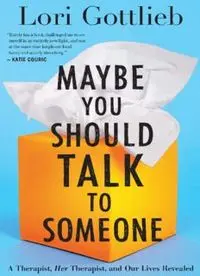
Maybe You Should Talk to Someone: A Therapist, HER Therapist, and Our Lives Revealed PDF
Preview Maybe You Should Talk to Someone: A Therapist, HER Therapist, and Our Lives Revealed
Contents Title Page Contents Copyright Epigraph Author’s Note Part One Idiots If the Queen Had Balls The Space of a Step The Smart One or the Hot One Namast’ay in Bed Finding Wendell The Beginning of Knowing Rosie Snapshots of Ourselves The Future Is Also the Present Goodbye, Hollywood Welcome to Holland How Kids Deal with Grief Harold and Maude Hold the Mayo The Whole Package Without Memory or Desire Part Two Fridays at Four What We Dream Of The First Confession Therapy with a Condom On Jail Trader Joe’s Hello, Family The UPS Guy Embarrassing Public Encounters Wendell’s Mother Addicted The Rapist On the Clock Part Three My Wandering Uterus Emergency Session Karma Just Be Would You Rather? The Speed of Want Ultimate Concerns Legoland How Humans Change Fathers Integrity Versus Despair My Neshama What Not to Say to a Dying Person Boyfriend’s Email Wendell’s Beard Part Four The Bees Kenya Psychological Immune System Counseling Versus Therapy Deathzilla Dear Myron Mothers The Hug Don’t Blow It It’s My Party and You’ll Cry if You Want To Happiness Is Sometimes Wendell A Pause in the Conversation Acknowledgments About the Author Connect with HMH Copyright © 2019 by Lori Gottlieb All rights reserved For information about permission to reproduce selections from this book, write to It is proposed that happiness be classified as a psychiatric disorder and be included in future editions of the major diagnostic manuals under the new name: major affective disorder, pleasant type. In a review of the relevant literature it is shown that happiness is statistically abnormal, consists of a discrete cluster of symptoms, is associated with a range of cognitive abnormalities, and probably reflects the abnormal functioning of the central nervous system. One possible objection to this proposal remains—that happiness is not negatively valued. However, this objection is dismissed as scientifically irrelevant. —RICHARD BENTALL, JOURNAL OF MEDICAL ETHICS, 1992 The eminent Swiss psychiatrist Carl Jung said this: “People will do anything, no matter how absurd, to avoid facing their own souls.” But he also said this: “Who looks inside, awakes.” Author’s Note This is a book that asks, “How do we change?” and answers with “In relation to others.” The relationships I write about here, between therapists and patients, require a sacred trust for any change to occur. In addition to attaining written permission, I have gone to great lengths to disguise identities and any recognizable details, and in some instances, material and scenarios from a few patients have been attributed to one. All changes were carefully considered and painstakingly chosen to remain true to the spirit of each story while also serving the greater goal: to reveal our shared humanity so that we can see ourselves more clearly. Which is to say, if you see yourself in these pages, it’s both coincidental and intentional. A note on terminology: Those who come to therapy are referred to in various ways, most commonly as patients or clients. I don’t believe that either word quite captures the relationship I have with the people I work with. But the people I work with is awkward, and clients might be confusing, given that term’s many connotations, so for simplicity and clarity, I use patients throughout this book. Part One Nothing is more desirable than to be released from an affliction, but nothing is more frightening than to be divested of a crutch. —James Baldwin 1 Idiots CHART NOTE, JOHN: Patient reports feeling “stressed out” and states that he is having difficulty sleeping and getting along with his wife. Expresses annoyance with others and seeks help “managing the idiots.” Have compassion. Deep breath. Have compassion, have compassion, have compassion . . . I’m repeating this phrase in my head like a mantra as the forty-year-old man sitting across from me is telling me about all of the people in his life who are “idiots.” Why, he wants to know, is the world filled with so many idiots? Are they born this way? Do they become this way? Maybe, he muses, it has something to do with all the artificial chemicals that are added to the food we eat nowadays. “That’s why I try to eat organic,” he says. “So I don’t become an idiot like everyone else.” I’m losing track of which idiot he’s talking about: the dental hygienist who asks too many questions (“None of them rhetorical”), the coworker who only asks questions (“He never makes statements, because that would imply that he had something to say”), the driver in front of him who stopped at a yellow light (“No sense of urgency!”), the Apple technician at the Genius Bar who couldn’t fix his laptop (“Some genius!”). “John,” I begin, but he’s starting to tell a rambling story about his wife. I can’t get a word in edgewise, even though he has come to me for help. I, by the way, am his new therapist. (His previous therapist, who lasted just three sessions, was “nice, but an idiot.”) “And then Margo gets angry—can you believe it?” he’s saying. “But she doesn’t tell me she’s angry. She just acts angry, and I’m supposed to ask her what’s wrong. But I know if I ask, she’ll say, ‘Nothing,’ the first three times, and then maybe the fourth or fifth time she’ll say, ‘You know what’s wrong,’ and I’ll say, ‘No, I don’t, or I wouldn’t be asking! ’” He smiles. It’s a huge smile. I try to work with the smile—anything to change his monologue into a dialogue and make contact with him.
